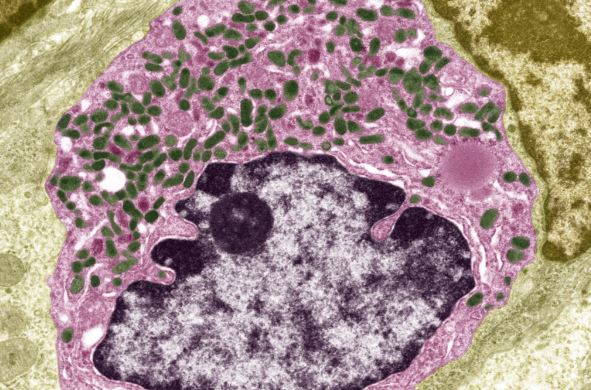A team of scientists has put forth a fresh explanation for certain cases of long Covid, predicated on their discovery that serotonin levels were notably lower in individuals grappling with this complex condition.
In a study published in the journal Cell on Monday, researchers from the University of Pennsylvania propose that the reduction in serotonin is prompted by lingering remnants of the virus in the gut. They suggest that diminished serotonin levels could particularly account for memory problems, as well as certain neurological and cognitive symptoms often associated with long Covid.
This study is just one of several recent research endeavors that have identified distinct biological alterations in individuals affected by long Covid. These discoveries are vital for a condition that manifests in diverse ways and often eludes conventional diagnostic tools like X-rays.
The findings from these studies could pave the way for potential treatments, including medications designed to boost serotonin levels. The authors of this study contend that the biological pathway they’ve outlined could reconcile many of the leading theories regarding the underlying causes of long Covid, such as residual virus fragments, inflammation, heightened blood clotting, and autonomic nervous system dysfunction.
She and her colleagues at the Icahn School of Medicine at Mount Sinai recently conducted a study that uncovered other biological changes linked to certain long Covid cases, including hormone cortisol levels. These studies may indicate specific subtypes of long Covid or varying biological markers at different stages of the condition.
The researchers conducted blood analysis on 58 patients who had been grappling with long Covid for periods ranging from three months to 22 months post-infection. These results were then compared to blood samples from 30 individuals with no post-Covid symptoms and 60 patients in the early, acute stage of coronavirus infection.
Maayan Levy, one of the lead authors and an assistant professor of microbiology at the Perelman School of Medicine, noted that serotonin levels and other metabolites underwent alterations right after a coronavirus infection, a response also observed in the wake of other viral infections. However, in individuals with long Covid, serotonin was the sole significant molecule that did not rebound to its pre-infection levels.
The research team examined stool samples from some of the long Covid patients, discovering that they still contained residual viral particles. By amalgamating these patient findings with research conducted on mice and miniature human gut models (where serotonin is primarily produced), the team identified a potential pathway underlying certain long Covid cases.
Here’s the premise: Lingering viral remnants stimulate the immune system to generate interferons, proteins that combat infections. Interferons trigger inflammation that hampers the body’s ability to absorb tryptophan, an amino acid crucial for serotonin production in the gut. Blood clots, which can form after a coronavirus infection, may obstruct the body’s serotonin circulation.
Depleted serotonin disrupts the vagus nerve system, responsible for transmitting signals between the body and the brain, as noted by the researchers. Since serotonin plays a role in short-term memory, the researchers posit that its depletion could lead to the memory problems and other cognitive issues frequently experienced by those with long Covid.
However, some caveats must be considered. The study wasn’t extensive, necessitating confirmation through further research. Additionally, participants in other long Covid studies, where some individuals exhibited milder symptoms, didn’t consistently display serotonin depletion. Dr. Levy suggested that serotonin depletion may be specific to individuals with long Covid experiencing multiple severe symptoms.
Scientists are actively seeking biomarkers for long Covid, which are biological changes that can be measured to aid in the diagnosis of the condition. The new study suggests three potential biomarkers: the presence of viral remnants in stool, low serotonin levels, and elevated interferon levels.
While experts largely concur that there may not be a single biomarker for the condition, several indicators are likely to emerge and may vary based on the type of symptoms and other factors.
Efforts to find effective treatments for long Covid are underway, with clinical trials of various treatments currently in progress. Dr. Levy and Dr. Thaiss have indicated their intention to initiate a clinical trial to test fluoxetine, a selective serotonin reuptake inhibitor often marketed as Prozac, and potentially tryptophan as well.

